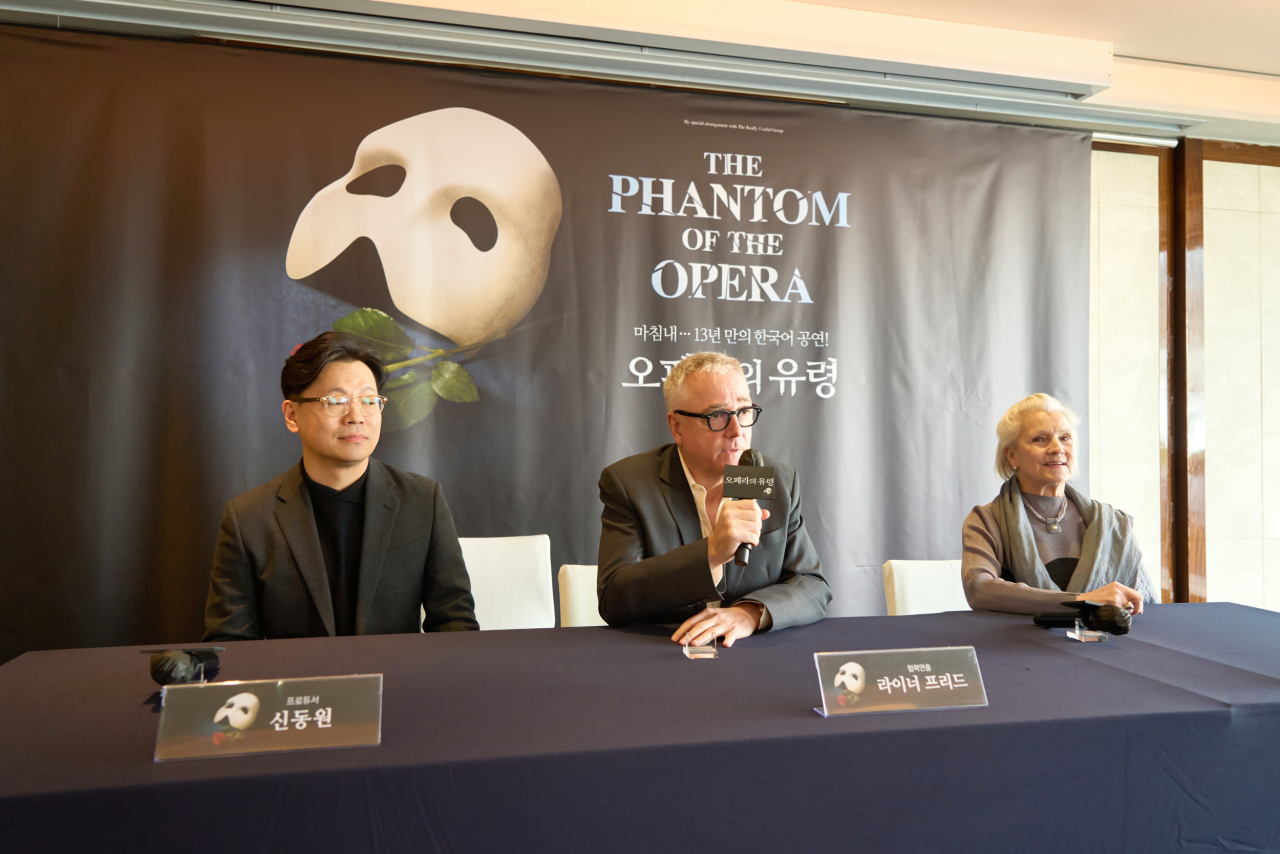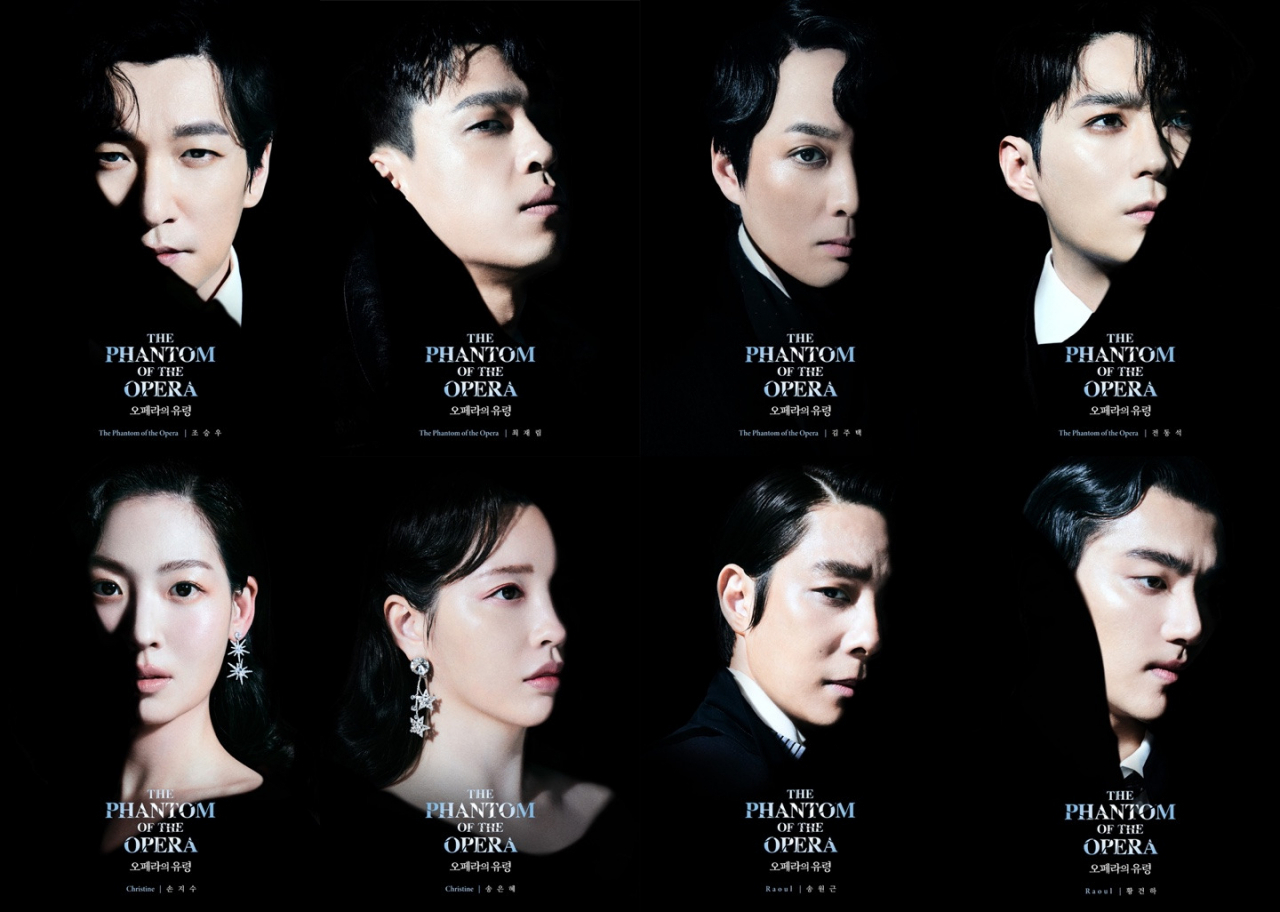 |
(From left) S&CO CEO Danny Sihn, Rainer Fried, the associate director of the international tour production of "The Phantom of the Opera" and Denny Berry, associate choreographer. (S&CO) |
The musical “The Phantom of the Opera” will kick off in Busan in March, a significant event on many levels. Not only is it the third Korean production of the iconic musical that took the local musical industry by storm with its debut in 2001, it is returning to Korea after 13 years.
Danny Sihn, CEO and producer of S&CO, told reporters during a press conference on Monday that the latest production is focused on preserving the original vision of the 35-year-old musical created by legendary composer and playwright Andrew Lloyd Webber, while delivering the story smoothly through the Korean language.
“For the productions in 2001 and 2009, there were some circumstances in which we couldn’t do everything we wanted to in terms of translation,” Sihn said.
The circumstances, he added, stemmed from the efforts to keep true to the original production and the result was a somewhat unnatural translation. “This time, we improved the translation, tailoring it to Korean actors and culture. If you saw (the musical) in 2009, you might see many changes (in the translation),” he said.
The casting process also was a new experience to the production team including, Rainer Fried, the associate director of the musical's international tour production, and Denny Berry, the associate choreographer.
The casting took place entirely through the internet, which was initially nerve-racking, Fried recalled. After meeting the cast, Fried’s concerns turned into the excitement of working with different actors from diverse backgrounds. “I found (working with multiple actors for one role) much easier than I feared. They are incredibly supportive of each other,” he added.
The third local production features a total of four Phantoms -- the headlining actor Cho Seung-woo, the musical actor Jeon Dong-suk and baritone Julian Kim as the Phantom for performances in Korea’s second-largest city from March 25 to June 18, after which the musical actor Choi Jae-rim will join in for the Seoul performances from July 14 to Nov. 17. Sohn Ji-soo and Song Eun-hye will play the role of Christine.
 |
(From left, top) Four actors, Cho Seung-woo, Choi Jae-rim, Julian Kim and Jeon Dong-suk, will play the Phantom. (From bottom, left) Sohn Ji-soo and Song Eun-hye take the role of Christine and Song Won-geun and Hwang Gun-ha will perform as Raoul. Actor Cho Seung-woo will play the Phantom. (S&CO) |
“The original team has gradually come to comprehend the nuance of multi-casting (for one role), but it took a lot of effort to persuade them,” Sihn told The Korea Herald.
He added that by commencing the tour in Busan, he hopes to invigorate the city's performing arts scene.
"With the establishment of the Dream Theater dedicated to musicals, Busan is now fully equipped to host large-scale productions such as 'The Phantom of the Opera' and I hope the tour will breathe new life into the city's cultural scene," Sihn added.
The upcoming production is the third Korean production and sixth "The Phantom of the Opera," including three tours by the original production.
At the onset of the pandemic, the original team's tour of South Korea in 2020 was the only "The Phantom of the Opera" production that was staged and changed the preconceptions abroad about Korean cultural products, which led to the idea of a much-anticipated local production, according to Sihn.
Regardless of any new significance of the local production, Berry, the associate choreographer, said that the story of "The Phantom of the Opera" is timeless.
"It's a universal story of love and rejection. It transcends generations and cultures," said Berry when asked about what makes the musical a classic that continues to draw audiences worldwide.
Webber's hit musical, based on the 1910 French novel by Gaston Leroux, opened in the West End in 1986 before making its Broadway debut in 1988.
Marking 35 years on Broadway, “The Phantom of the Opera,” the longest-running musical in Broadway's history, will be staged for the last time on April 16 at the Majestic Theatre. The flagship London production will continue.
The musical won numerous awards including the Olivier Award for Musical of the Year in 1986 and the Tony Award for Best Musical in 1988. It has since inspired the 2004 Joel Schumacher film adaptation starring Emmy Rossum, Gerard Butler, Patrick Wilson and Minnie Driver.
The first production in 2001 in Korea generated 19.2 billion won ($15.4 million) in ticket sales with an audience of about 240,000 for 244 performances. At the time, Korea’s musical industry was worth about 3 billion won, and it was a huge commercial success that highlighted the potential of the musical market.
In 2005, the original team visiting Korea attracted 195,000 people and the 2009 local production was watched by some 300,000 people.







![[Today’s K-pop] Blackpink’s Jennie, Lisa invited to Coachella as solo acts](http://res.heraldm.com/phpwas/restmb_idxmake.php?idx=644&simg=/content/image/2024/11/21/20241121050099_0.jpg)